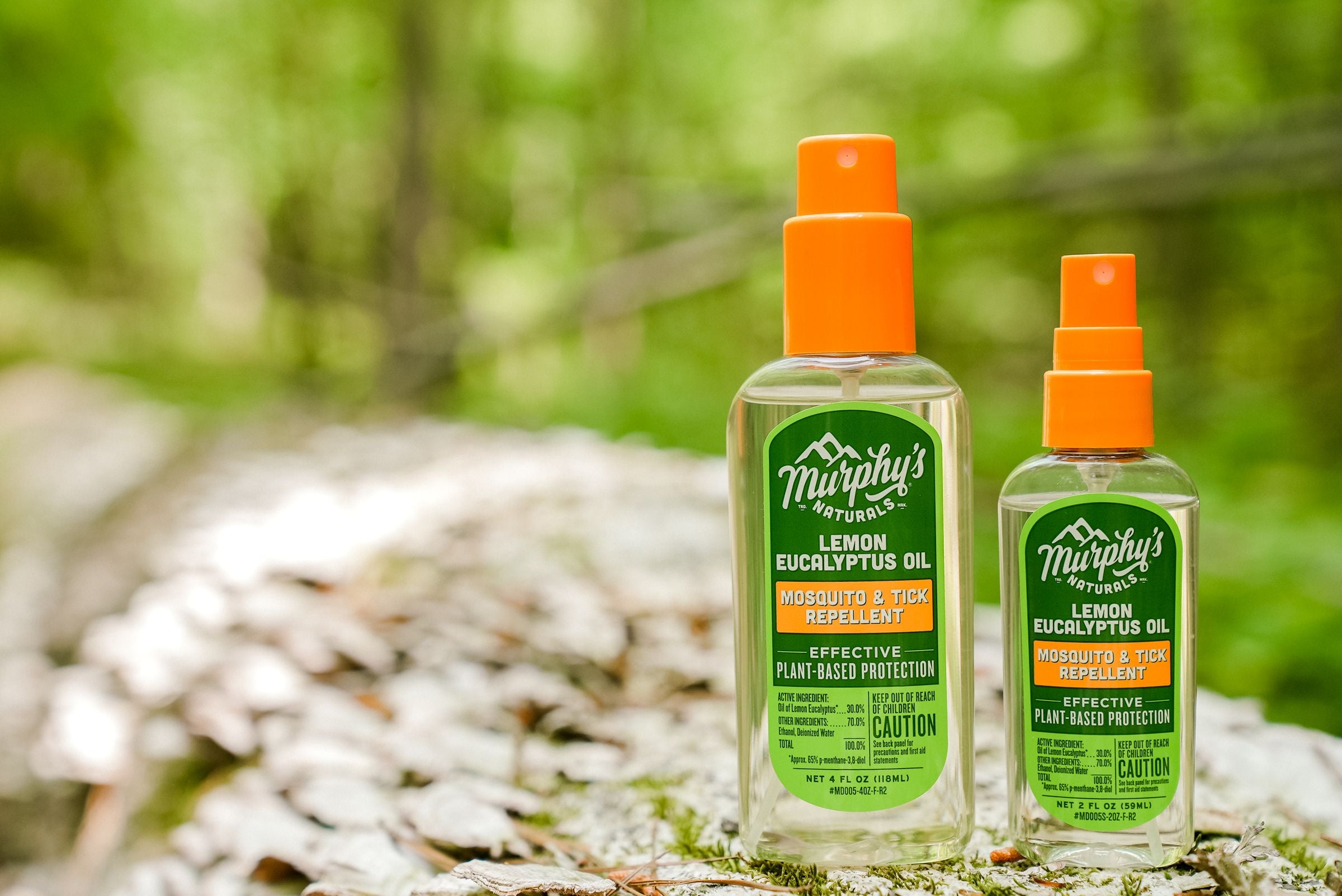While DEET is an effective mosquito repellent that has been around for years, there are other alternatives available that can protect you from these pesky insects. Keep reading to learn about DEET alternatives and other tips to prevent mosquito bites.
What is DEET?
DEET (N,N-Diethyl-meta-toluamide) is an active ingredient found in most insect repellents on the market today. This yellowish liquid was created by the United States Department of Agriculture in 1946 to protect the U.S. Army in insect-infested areas and became commercially available in the U.S. in 1957.
DEET is believed to repel mosquitoes by altering their smell receptors and blocking their ability to feed, ultimately preventing them from landing on your skin or clothing. DEET is available in sprays, lotions, balms, wipes, and sticks that range in concentrations from 4%–100%. The percentage of DEET in a product is tied to how long the product will repel insects. For example, a product with a concentration of 100% DEET can repel mosquitoes for up to 12 hours, while products with lower concentrations can repel mosquitoes for anywhere between three and six hours.
Oil of lemon eucalyptus
Oil of lemon eucalyptus (OLE) is the only plant-based ingredient approved by the Environmental Protection Agency (EPA) and recommended by the Centers for Disease Control (CDC) as a viable natural insect repellent. It provides protection against mosquitoes for up to six hours and is as effective as DEET at repelling mosquitoes and ticks. OLE doesn’t leave behind a sticky or greasy residue and doesn’t have an overwhelming odor. It’s also doesn’t harm your gear.
At Murphy’s Naturals, oil of lemon eucalyptus is harvested sustainably through a partnership with Citrefine®, a family-run company that includes only the original essential oil components found in the eucalyptus citriodora oil during harvesting. Citrefine harvests the oil from groves of eucalyptus citriodora trees that are maintained without any pesticides or herbicides.

Picaridin
Picaridin, also known as icaridin, is a synthetic compound that was made to resemble piperidine, a natural compound found in the plants that produce black pepper. It works at repelling mosquitoes, ticks, chiggers, gnats, and other biting insects. Similar to oil of lemon eucalyptus, picaridin doesn’t leave your skin feeling greasy after application and doesn’t have a strong odor. It’s also safe to use on your skin and clothing and doesn’t harm your gear.
DEET and picaridin are two of the more popular insect repellents available, but picaridin has only been commercially available in the United States since 2005. Additionally, picaridin and DEET aren’t natural, plant-based ingredients unlike oil of lemon eucalyptus.
IR3535
IR3535 (Ethyl butylacetylaminopropionate) is a synthetic insect repellent that was developed by Merck, a pharmaceutical company, in the 1980s. Also known as Insect Repellent 3535, IR3535 repels mosquitoes by messing with their sense of smell. It’s one of four insect repellents recommended by the CDC for protection against mosquitoes that carry the Zika virus. It also protects against mosquitoes that carry the West Nile virus and Chikungunya virus.
Apply IR3535 directly to your skin for four to eight hours of protection. Studies have shown that IR3535 is generally safe to use, but some side effects include eye irritation if the product gets in your eyes and mild skin irritation in higher concentrations.
2-Undecanone
This natural, non-toxic compound is a plant-based repellent that has some effectiveness against ticks and mosquitoes. It’s a colorless oil that’s produced synthetically but is found naturally in wild tomatoes, bananas, strawberries, guava, and ginger. Similar to DEET, 2-undecanone has a strong odor. It comes in the form of liquids, aerosols, and gels.
Neem oil
According to a 2015 study in the Malaria Journal, a concentration of 20% neem oil provided 70% protection against mosquitoes for three hours. Neem oil can also repel a variety of other insects, including caterpillars, aphids, Japanese beetles, mites, and locusts. If you want a natural repellent that provides slightly longer protection against mosquitoes, OLE is a great alternative.
Other tips to prevent mosquito bites
While using an insect repellent can help prevent mosquito bites, following these tips can also reduce your chances of getting bit:
- Put on sunscreen before repellent. According to the CDC, some DEET repellents can reduce the sun protection factor of your sunscreen by one-third if applied over the sunscreen. Because of this, it’s recommended that you reapply your sunscreen more often for maximum protection from UVA and UVB rays.
- Always follow the instructions on the repellent’s product label before applying a repellent.
- Apply repellent to clean and unbroken skin—don’t apply it to injured, broken, or irritated skin.
- When applying insect repellent to your face, rub the repellent in your hands first before applying it to your face.
- According to the EPA, don’t apply insect repellent under your clothes.
- Remove standing water in your yard. Mosquitoes are attracted to pools of water and random puddles around your home can become a breeding ground for these insects.
- Mosquitoes tend to hide in the shade of tall grasses, so mow your lawn regularly and trim any overgrown brush to reduce the number of hiding spots mosquitoes can thrive in.
- When you’re outside, bring a portable fan with you to keep mosquitoes away. If you’ll be sitting in a larger area, consider putting an oscillating fan in the space to disrupt a mosquito’s flying patterns.
- Wear long sleeves and pants to reduce the number of areas on your body that mosquitoes can bite.
- Avoid going outside at dusk and dawn, as these are the most prevalent times for mosquitoes to emerge.
- If you do use essential oils, including peppermint oil, geraniol, and clove oil, to ward off mosquitoes, avoid going out in the sun for long periods to prevent skin irritation.
Why Murphy’s Naturals
Murphy’s Naturals provides a variety of natural repellents that protect against mosquitoes and ticks. From our Lemon Eucalyptus Oil Insect Repellent Spray (LEO Spray) to our Mosquito Repellent Candles, we provide products that consist of natural ingredients that the EPA has approved to be used in natural products.
Each Murphy’s Naturals product features the following characteristics:
- Natural products that actually work: Our team measures the effectiveness of our products by using a high concentration of natural active ingredients in each product, measuring how long a product provides protection for, and reading customer reviews about our products.
- Made with plant-based ingredients: All of Murphy’s products use plant-based ingredients and some include essential oil blends that are overlooked by other manufacturers.
- Focused on celebrating nature: Murphy’s Naturals focuses on sustainability and is intentional about the packaging of its products to the sourcing of its materials.
- Each purchase gives back: Murphy’s Naturals donates 2% of the revenue generated toward local and global organizations, such as the Raleigh City Farm and the Plastic Ocean Project.


